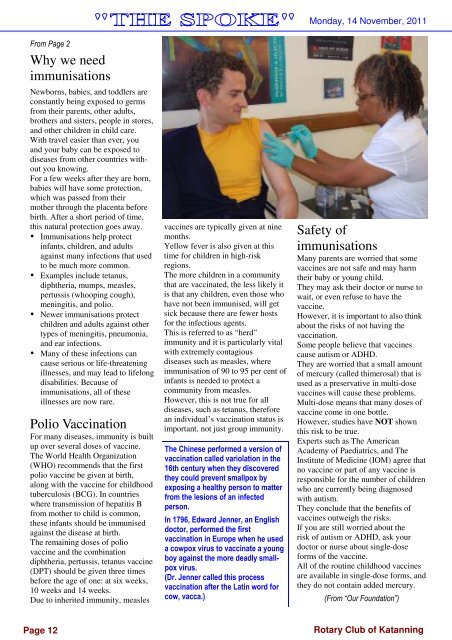Vol 7-18-Nov 14 - Katanning Rotary Club
Vol 7-18-Nov 14 - Katanning Rotary Club
Vol 7-18-Nov 14 - Katanning Rotary Club
You also want an ePaper? Increase the reach of your titles
YUMPU automatically turns print PDFs into web optimized ePapers that Google loves.
Monday, <strong>14</strong> <strong>Nov</strong>ember, 2011From Page 2Why we needimmunisationsNewborns, babies, and toddlers areconstantly being exposed to germsfrom their parents, other adults,brothers and sisters, people in stores,and other children in child care.With travel easier than ever, youand your baby can be exposed todiseases from other countries withoutyou knowing.For a few weeks after they are born,babies will have some protection,which was passed from theirmother through the placenta beforebirth. After a short period of time,this natural protection goes away. Immunisations help protectinfants, children, and adultsagainst many infections that usedto be much more common. Examples include tetanus,diphtheria, mumps, measles,pertussis (whooping cough),meningitis, and polio. Newer immunisations protectchildren and adults against othertypes of meningitis, pneumonia,and ear infections. Many of these infections cancause serious or life-threateningillnesses, and may lead to lifelongdisabilities. Because ofimmunisations, all of theseillnesses are now rare.Polio VaccinationFor many diseases, immunity is builtup over several doses of vaccine.The World Health Organization(WHO) recommends that the firstpolio vaccine be given at birth,along with the vaccine for childhoodtuberculosis (BCG). In countrieswhere transmission of hepatitis Bfrom mother to child is common,these infants should be immunisedagainst the disease at birth.The remaining doses of poliovaccine and the combinationdiphtheria, pertussis, tetanus vaccine(DPT) should be given three timesbefore the age of one: at six weeks,10 weeks and <strong>14</strong> weeks.Due to inherited immunity, measlesvaccines are typically given at ninemonths.Yellow fever is also given at thistime for children in high-riskregions.The more children in a communitythat are vaccinated, the less likely itis that any children, even those whohave not been immunised, will getsick because there are fewer hostsfor the infectious agents.This is referred to as “herd”immunity and it is particularly vitalwith extremely contagiousdiseases such as measles, whereimmunisation of 90 to 95 per cent ofinfants is needed to protect acommunity from measles.However, this is not true for alldiseases, such as tetanus, thereforean individual’s vaccination status isimportant, not just group immunity.The Chinese performed a version ofvaccination called variolation in the16th century when they discoveredthey could prevent smallpox byexposing a healthy person to matterfrom the lesions of an infectedperson.In 1796, Edward Jenner, an Englishdoctor, performed the firstvaccination in Europe when he useda cowpox virus to vaccinate a youngboy against the more deadly smallpoxvirus.(Dr. Jenner called this processvaccination after the Latin word forcow, vacca.)Safety ofimmunisationsMany parents are worried that somevaccines are not safe and may harmtheir baby or young child.They may ask their doctor or nurse towait, or even refuse to have thevaccine.However, it is important to also thinkabout the risks of not having thevaccination.Some people believe that vaccinescause autism or ADHD.They are worried that a small amountof mercury (called thimerosal) that isused as a preservative in multi-dosevaccines will cause these problems.Multi-dose means that many doses ofvaccine come in one bottle.However, studies have NOT shownthis risk to be true.Experts such as The AmericanAcademy of Paediatrics, and TheInstitute of Medicine (IOM) agree thatno vaccine or part of any vaccine isresponsible for the number of childrenwho are currently being diagnosedwith autism.They conclude that the benefits ofvaccines outweigh the risks.If you are still worried about therisk of autism or ADHD, ask yourdoctor or nurse about single-doseforms of the vaccine.All of the routine childhood vaccinesare available in single-dose forms, andthey do not contain added mercury.(From “Our Foundation”)Page 12<strong>Rotary</strong> <strong>Club</strong> of <strong>Katanning</strong>
















